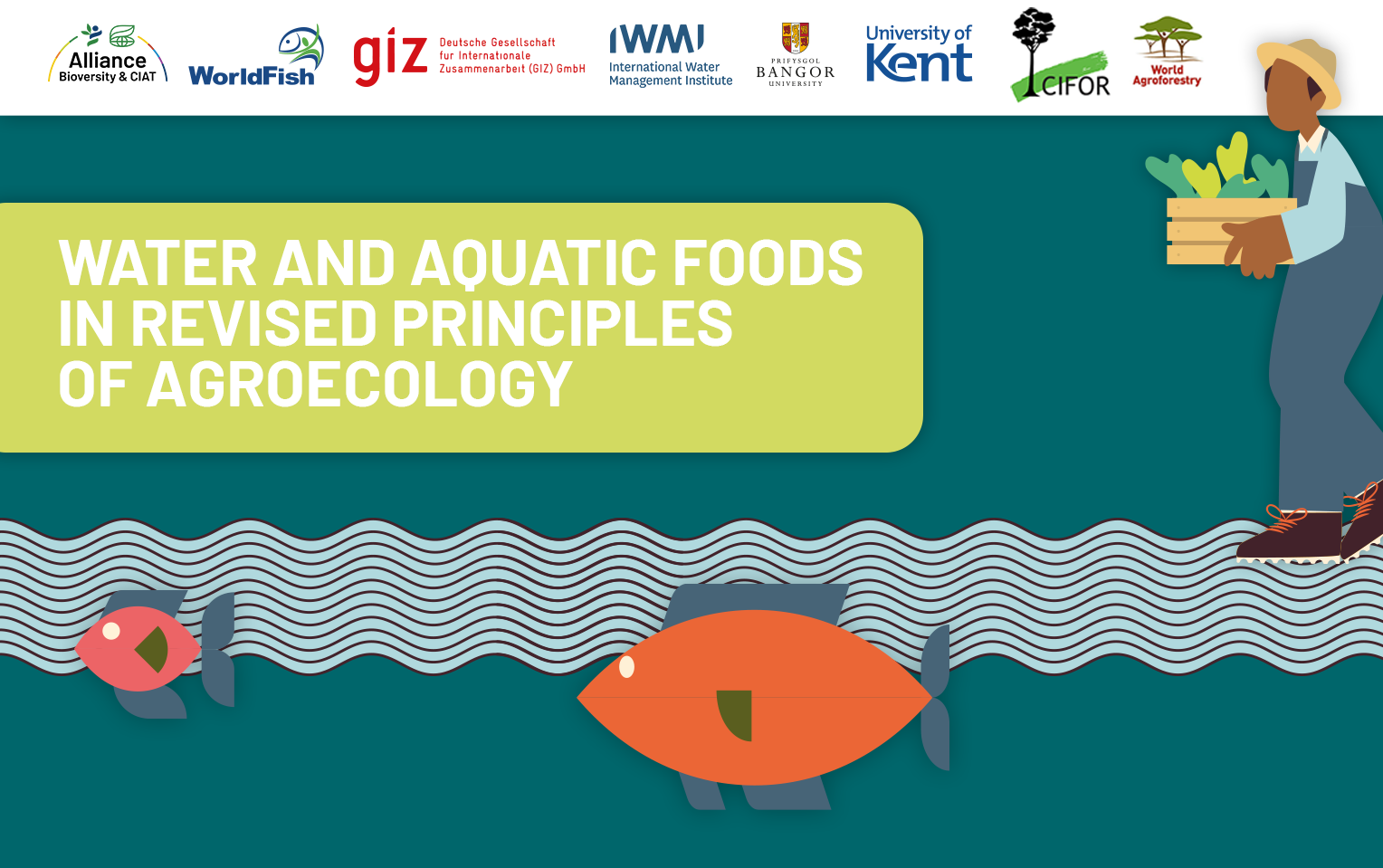How incorporating water and aquatic food in agroecological principles can accelerate food system transformation.
In a novel perspective piece in the journal Nature Food, scientists from four international research organisations and two UK universities, urge the global community to better integrate water and aquatic foods in efforts to make food systems more sustainable and equitable.
They argue that despite the importance of water for agricultural production, it is hardly mentioned in the agroecological principles that are driving discourse and action around the food system transformation that is necessary to tackle interacting global challenges of hunger, climate change, biodiversity loss and widespread degradation of land and water resources.
‘No water, no food. Agriculture is the biggest user and polluter of water’ says Matthew McCartney, leader of research on sustainable water infrastructure and ecosystems at the International Water Management Institute (IWMI), and he goes on ‘this means that ensuring water is at the heart of agroecology is essential for a just and sustainable food future.’
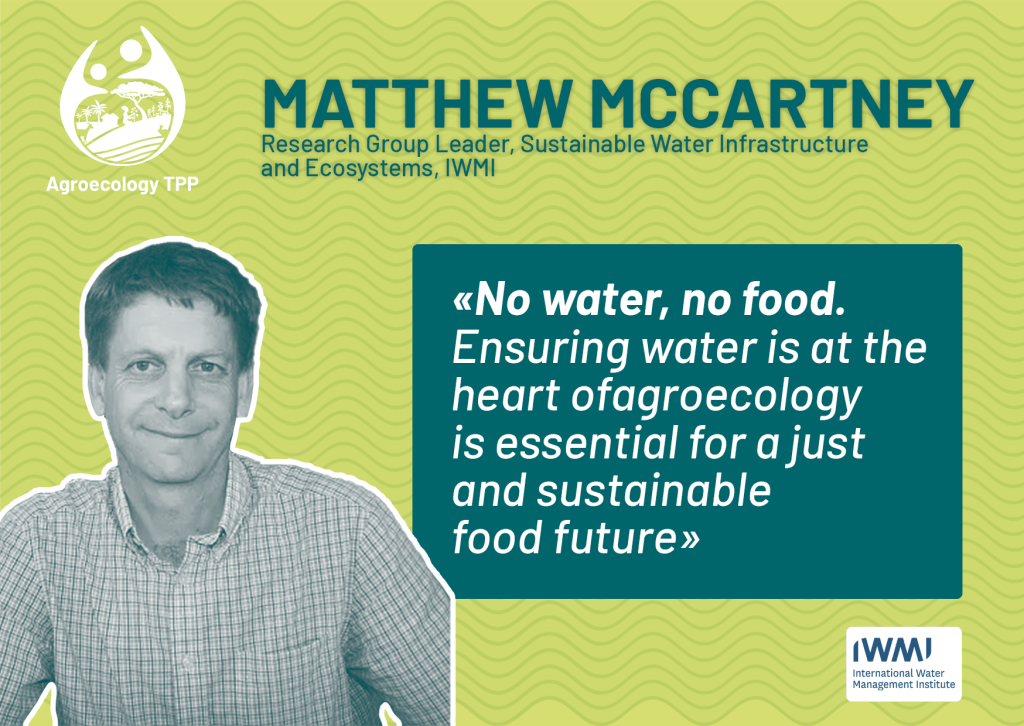
Agroecology
The focus on water getting more traction in agroecology, is because while there is a lot of talk about transformation of food systems, much of it only scratches the surface in suggesting marginal improvements to the efficiency of a fundamentally unsustainable agricultural model, based on propping up crop monocultures and largely separate intensive livestock rearing, with environmentally disruptive chemical inputs.
Agroecology is different in promoting ways of farming in harmony with nature and ensuring equitable value chains, connectivity and governance across food systems. This rests on diversification and integration that can deliver productivity, resilience and equity at the same time. The UN Committee on World Food Security (CFS), High Level Panel of Experts (HLPE) published a report on agroecology in 2019 that articulated 13 principles of agroecology that have driven discourse and action around food systems transformation since the UN Food Systems Summit in 2021. A key outcome of the summit was the creation of a coalition to transform food systems through agroecology involving over 50 countries, three regional commissions (the African Union, European Union and the Economic Community of West African States (ECOWAS), and over 300 organisations.
Sarah Freed, lead author of the perspective and scientist at the Alliance of Bioversity and CIAT suggests that ‘as agroecology gains traction with decision-makers, donors, and researchers, it is vital that its holistic spirit is not lost’ she goes on to emphasise that ‘our proposed revisions to the agroecological principles help ensure that land-to-seascapes, aquatic biodiversity, and the voices of fishers and other off-farm food producers are fully integrated into agroecological policy and investments’.
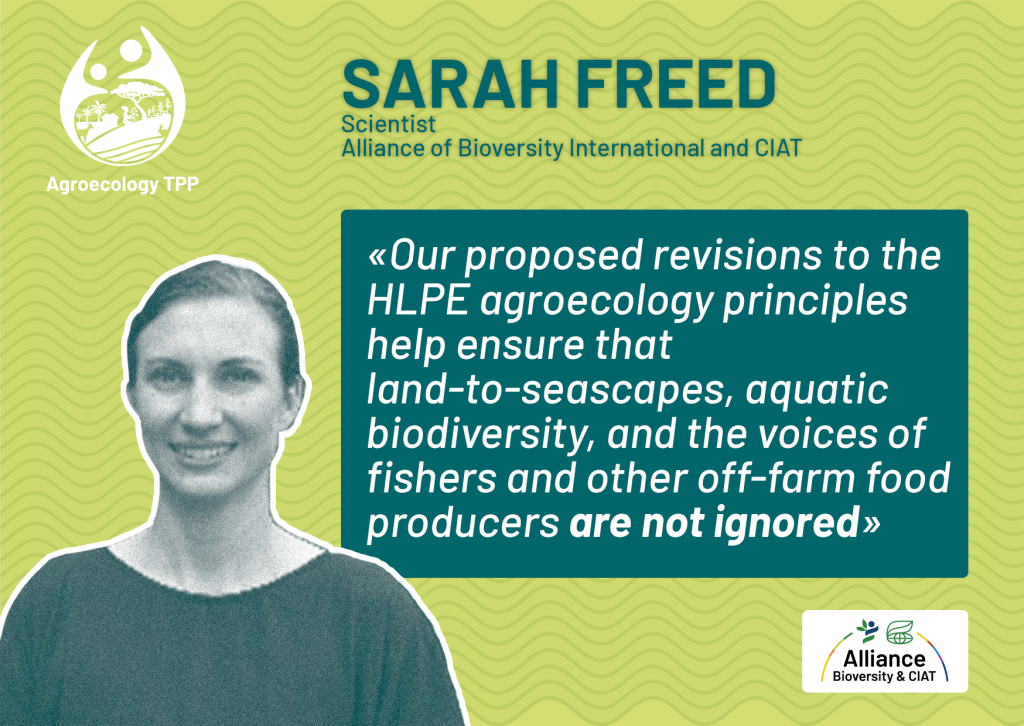
Water connects people and ecosystems
This brings to light the important way in which water connects people and ecosystems across landscapes, from ridge to reef, down to the sea. What a farmer does in their fields many miles from the ocean, when aggregated with all the other farmers between them and the sea, contributes to increasingly extensive marine pollution.
Mark Smith, Director General of IWMI links this to climate change in pointing out that ‘Water links people and ecosystems, and as droughts and floods grow more extreme, managing water in agriculture is key to productive farms, safer communities, and cleaner seas’.
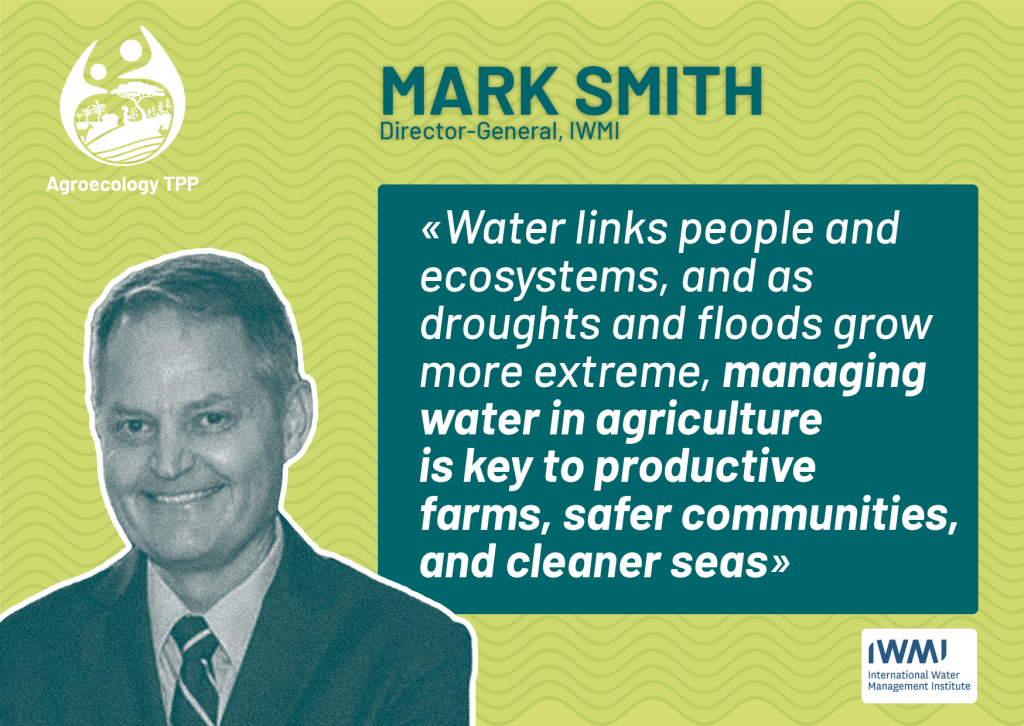
Aquatic food
Water is not only important for global food security and nutrition because it underpins farm productivity, aquatic food – the food derived from fish and other aquatic organisms, is a critical part of many people’s diet.
Eddie Allison, Principal Scientist at World Fish clarifies that ‘aquatic foods provide around 20% of the animal-source protein intake of 3.3 billion people today and global demand is expected to nearly double by 2050’ making the consideration of aquatic food a central component of future food security.
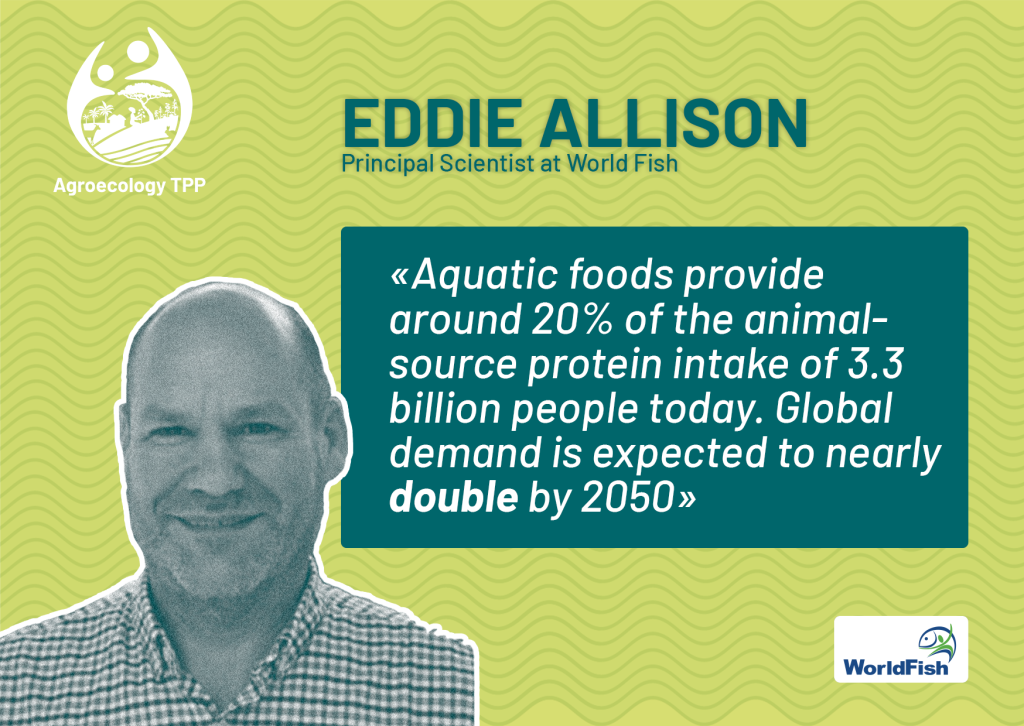
Social movements
Interestingly, while the academic discourse on agroecology has been slow to incorporate water and aquatic food, fisherfolk have been at the forefront of social movements pressing for agroecological transitions.
Michaela Lo a post-doctoral researcher at the Durrell Institute of Conservation and Ecology at the University of Kent was clear about this in stating that: ‘Agroecological literature has surged in recent decades—but still largely overlooks water, aquatic foods, and the role of fishers and other food producers. Meanwhile, as a social movement, agroecology is already embracing these crucial dimensions. It’s time high-level institutions and actors caught up!’

Key imperatives
To advance food system transformation, the authors recommend three cross-sectoral actions:
- Explicitly recognize the contributions of water and aquatic foods in agroecological principles, policy, investments and practice.
- Broaden the description of food producers to explicity include fishers, foragers, pastoralists and others food system actors as well as farmers.
- Address land-to-seascape connectivity and feedbacks mediated through water resources, embracing both productivity of agroecosystems and their environmental impact.
Living principles
‘Agroecology offers a bold vision for transforming food systems — and a very actionable one — because it has a set of explicit principles’ says Fergus Sinclair, Professor Emeritus at Bangor University, who was the Project Lead for the CFS, HLPE report that articulated the 13 agroecological principles ‘keeping these principles alive in response to scientific scrutiny, as done here for including water and aquatic foods’, he goes on to say ‘is vital for them to continue to have impact’.
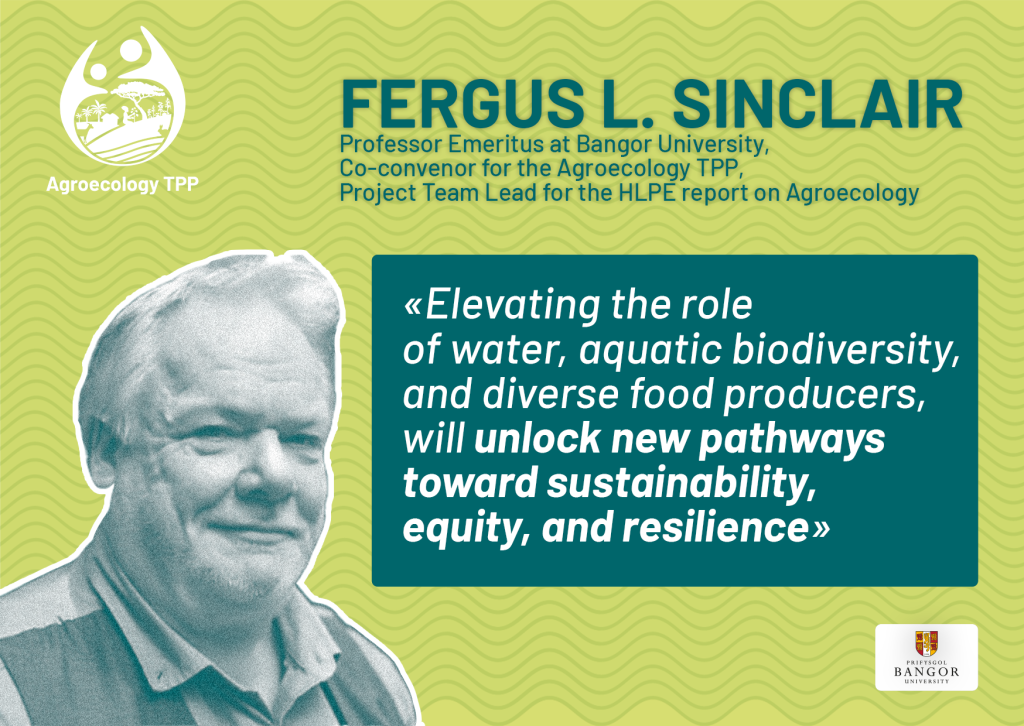
Further reading
The Nature Food article:
Freed S, Lo MGY, McCartney M, Allison EH, Smith DM, Joffre OM and Sinclair F (2025). Water and aquatic foods in revised principles of agroecology can accelerate food systems transformation. Nature Food
The agroecological principles:
Wezel A, Gemmill Herren B, Bezner Kerr R, Barrios E, Gonçalves ALR and Sinclair F (2020). Agroecological principles and elements and their implications for transitioning to sustainable food systems. A review. Agronomy for Sustainable Development 40: 40 13pp.

